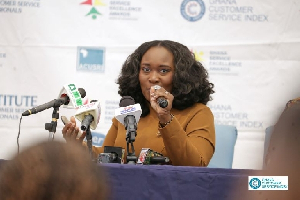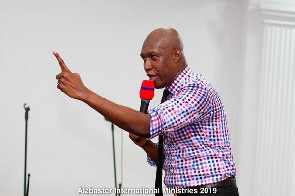Over the past decade, Ghana’s Energy sector has grown to become the backbone of the economy. The discovery of Oil and Gas in commercial quantities afforded the government extra revenue aside our traditional exports. The sector now contributes immensely to our Gross Domestic Product (GDP) and reduced our reliance on imported gas for power generation. Due to lack of planning by successive governments, the sector experienced power outages in 2012 which lasted for 4 years.
The Institute For Energy Policies and Research (INSTEPR) wants to highlight some key areas that need attention in 2021 and beyond. The Institute will publish a barometer every 6 months to measure the government’s success in the implementation of the STRATEGIC NATIONAL ENERGY PLAN (SNEP 2030) and the ENERGY SECTOR RECOVERY PROGRAM (ESRP).
The growth in the sector has made it impossible for a single Ministry to properly manage the entire energy sector. In the 1990s the ministry was called, Ministry of Mines and Energy. This Ministry was then split to provide focus for the Energy sector and manage growth. We strongly believe that the time has come for two new Ministries, Ministry of Power and Ministry for Oil and Gas, to properly manage this sector. The Ministry of Power will oversee Gridco, ECG, NEDco, VRA, IPPs, Bui Authority as well as the yet to be established Renewable Authority (Stated in Amended Act 832). The Ministry of Oil and Gas will oversee GNPC, IOCs, Petroleum Commission, TOR, BOST, NPA and GCMC.
POWER
The power sub-sector is the one area that needs serious attention as well as resources. The ESRP stipulates that if no action is taken, the indebtedness within the power sector could reach USD $12,524 million by 2023 which will be about 18.7% of our current GDP. In the post Covid-19 world this growing debt can collapse the economy.
The country has a total dependable power of 4657 MW as of June 2020 and a peak demand of 2957 MW (Valco Operating One Pot). The peak demand is growing at approximately 10% year on year. The on-going industrial policy of 1D1F and the high gold prices will make the local Mining companies increase the demand for electricity. If the post Covid-19 economic environment does not affect our local Industries as in Europe and America, the total peak demand will reach around 4329 MW by 2024. This means our dependable capacity should grow to about 5,000 MW by 2024.
The critical decision by government that will affect the growth of Ghana’s generating capacity is the issue of TAKE OR PAY and TAKE AND PAY. In 2021, the government needs to give a clear indication on how the new policy of TAKE AND PAY will be implemented for the existing Power Purchase Agreements (PPA) which have TAKE OR PAY. Since the Minister of Finance made the announcement on the floor of parliament that all TAKE OR PAY agreements will be converted to TAKE AND PAY, nothing to that effect has happened. This has created uncertainty for investors in the power sector.
The Independent Power Producers (IPPs) has an unpaid invoice of up to USD $1.44 Billion as of September 2020, according to CIPDiB. This debt keeps growing though the Cash Waterfall Mechanism has been implemented since April 2020. The total revenue collected by ECG from consumers is not enough to meet the invoices from various stakeholders in the value chain. This is mostly to do with the technical and commercial losses experiences in Transmission and Distribution. There are transmission losses of 4.7% this year, which is 1.8% higher than the projected losses of 2.7%. Distribution losses have also increased to 26.63% as against the regulatory Benchmark of 23.2%.
There is a need for huge capital investment into the electricity distribution and transmission infrastructure in the country to help reduce these losses. The aborted Private Sector Participation (PSP) program with ECG was to invest over USD $500 million in new infrastructure to reduce these technical and commercial losses. The Institute is of the view that the PSP program should be initiated again in 2021. The ESRP seeks to restructure ECG to make it more effective but the fundamental problem of financing should be resolved alongside.
There has been agitation by the staff of Gridco throughout the year and we hope the Company is resourced to undertake major transmission repairs in 2021. The next power outages (Dumsor) in the country may happen as a result of bad transmission and distribution system. Old transformers and substations will make the electricity network unreliable causing low voltages, overloading and power outages.
The generating mix in Ghana currently is made up of 37.3% Hydro, 62.5% Thermal and 0.2% Renewable. There is an urgent need to produce more clean energy in line with the Paris Climate Agreement and the Sustainable Development Goal (SDG) 7. The renewable energy can serve small to medium communities through embedded generation. Other renewable energy such as Wind, Waste to Energy and Mini-Hydro Dams should be supported by the government in the coming year.
OIL AND GAS
In 2020 the world Oil industry collapsed due to Covid-19 pandemic. The price of Brent Crude Oil went from $53.78 per barrel to $13.78 during a period that the world economy was locked down. The government of Ghana is projected to lose over 51% of the oil revenue expected in the year due to low crude prices and reduced production. Most of the International Oil Companies in Ghana halted operations, notable among them is Aker Energy who suspended their work program. The upstream sub-sector was experiencing a slowdown in exploration activities prior to the Covid-19 pandemic. The indigenous Oil company, Springfield Energy drilled a well, Afina-1x, on the WCTP Block 2. This drill was successful and found 10 meters of hydrocarbon-bearing sands, including light oil and gas, in Turonian-age sands. This discovery has led to a Unitization talks between Springfield and ENI.
There are challenges ahead in 2021 for the Oil and Gas industry since the world Economy post Covid-19 is forecast to slow down until 2022 for recovery. Crude prices are around $50.78 and projected to be around $45 in the next 12 months according to Energy Information Administration (EIA). The Total Oil production in Ghana, using 2019 figures, was about 72.1 million barrels coming from the three main commercial fields, Jubilee (45%), TEN (31%) and Sankofa-Gye Nyame (24%). Although the projected daily production for the industry is 250,000 barrels, the highest daily production achieved so far is about 196,000 barrels.
A glance at the Petroleum Commission website shows eight (8) companies have failed to meet their work program commitments. Most of these companies do not have the capacity to undertake the exploration work program they have agreed to in their Petroleum Agreement. The government in 2021 should give a timeline and final notice to these companies to free up the Blocks for competent companies to acquire through Tender. This clean up exercise in the Upstream is very important if Ghana is to see growth in the production of Crude Oil. Some of the existing wells will be going into their decline phase in the coming years and if no new discoveries are made, the country will enter a period of no Oil production.
There are serious challenges ahead in 2021 and beyond but these can be overcome by proper planning and management. Financial resources are at the heart of most of these problems so the Institute expects the government to provide a detailed plan on how the needed finances will be provided. ESLA alone is not the answer since the receivables into the fund has been dwindling with the depreciation of the cedi over the years.
INSTEPR in January will do a review of TOR, BOST, ECG and Ghana Gas, all State-owned Organizations within the Energy sector, to outline the problems faced by these organization. We will also engage the management and government being the 100% shareholder, to discuss proposed solutions. The Institute prides itself for being the partner for development as well as promoting growth through good governance.
Press Releases of Thursday, 17 December 2020
Source: INSTEPR













